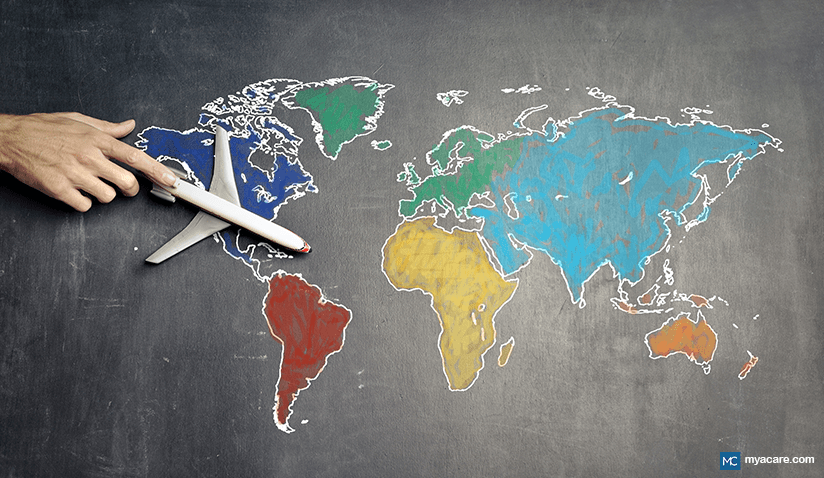5 MEDICAL TOURISM MYTHS YOU NO LONGER NEED TO BELIEVE

There is little worse than suffering from a health problem and not having the means to follow through with a solution. Medical tourism has helped millions of people worldwide gain access to treatments they would not be able to afford or have access to in their home country. In spite of this fact, having preconceived notions about foreign medical treatment is still one of the greatest factors holding many back from accessible healthcare today.
In an attempt to better global healthcare, we have gone ahead and debunked five myths about medical tourism.
Myth 1: Third-World Countries Lack Credible Healthcare Professionals & Facilities
This is one of the biggest myths concerning medical tourism abroad, especially for those seeking healthcare in India or other countries which are regarded as poverty stricken. While it is true that many hospitals in rural areas of third-world countries are understaffed and lacking proper facilities, it is not true of the main cities.
One look at the statistics will show you that roughly 25-39% of doctors studying in US medical schools are international students who have come to get the best education before travelling back home to provide top notch healthcare. Furthermore, a large amount of doctors in first-world countries are incentivized to participate in global healthcare to increase the standard and accessibility of healthcare worldwide. In 2013, as many as 73% of US graduates spent time abroad to hone their doctoring skills.
Another point to consider is that first-world countries that are seen with the highest standards of healthcare actually adopt a large number of foreign doctors to work in their hospitals.
In terms of facilities, a lot of investment has been placed into building state-of-the-art medical facilities in gorgeous locations globally to encourage medical tourism. Healthcare in Thailand is a prime example of this, having treatment facilities alongside spas that are situated in a near breathtaking, tropical setting.
A little known fact: ±800 hospitals outside the US are recognized as having a golden standard of healthcare with prestigious JCI accreditation. This has catapulted medical tourism into whole new dimensions with healthcare in Dubai, Thailand, Malaysia and much of the Middle East now being just as superior as found in the West.
Myth 2: You Have to Speak the Language or Face Big Risks
In the past, this myth may have held true to the average person who could not afford to hire their own personal translator! These days, this no longer applies.
Many medical tourism facilities make it a top priority to treat tourists and will almost always have staff that are well-versed in English. Some of the best facilities will even have translators or multiple doctors from different parts of the globe so that you have the option of being treated in your home language.
Technology has also come to the table with fantastic solutions that allow us to cross the language barrier. For example, platforms like Mya Care make it easy to connect with hospitals and physicians worldwide to find which places will be able to accommodate you and your specific needs.
Myth 3: It's Easier to Contract Diseases in Third-World Countries
A lot of people feel hesitant to travel abroad due to a perceived lack of sanitation as well as the risk of contracting deadly diseases. Fortunately, most private hospitals and medical tourism facilities adopt some of the strictest sanitation protocols to keep up with top global standards of healthcare. Many of them also hire world-class chefs to prepare food for foreigners to prevent culture shock and possible reactions to eating foreign food.
In countries where there is a higher likelihood of contracting a disease, measures are almost always put in place for people visiting those places such as mandatory vaccinations. On top of this fact, the hospitals in those countries will be the best equipped in the whole world to preventing and treating those specific ailments. You can rest assured that you will be in the safest hands when venturing abroad to the best medical facilities.
Once again, this myth only truly applies to impoverished nations in rural areas where accessibility to sanitation and proper healthcare is lacking.
Myth 4: Medical Tourism is just for Cosmetic Surgery
The idea of jumping on a plane to get a face lift under the guise of having a holiday is what comes to mind for many people when they consider medical tourism. The reality is that cosmetic surgery is only the tip of the iceberg in terms of what the world has to offer. Some of the best specialized healthcare physicians have taken to treating others abroad, dealing in specialties and treatments you would not ever see in your home country.
Myth 5: You Get What You Pay For
The notion that prices are cheaper overseas because the service or quality of healthcare is lesser is flawed. As mentioned above, world-class healthcare professionals travel overseas to work in some of the world's most prestigious hospitals and medical tourism destinations, which means that the quality is not compromised by the lesser fees.
There are numerous factors that affect the price of healthcare globally, such as:
- The cost of living in a certain place
- Laws and policies revolving around medical insurance
- Competition within the medical tourism industry
It's all about context. For example, a physician practicing healthcare in India will pay far less in living costs than they would in the US or UK. In first-world countries such as the US, insurance companies may also cover less of the expense, which is why the prices can be ridiculously high to cover running costs.
Due to the rising numbers of those traveling abroad for treatment, Healthcare in Malaysia, Thailand and other Eastern countries have received lots of investment in their private medical sectors too in order to take advantage of this field. Much competition has broken out amongst these countries to offer the best possible healthcare at the lowest possible costs.
Source
- https://www.ncbi.nlm.nih.gov/pubmed/29686763
- https://www.ncbi.nlm.nih.gov/pmc/articles/PMC3655883/
- http://www.medhalt.com/blog/busted-7-myths-medical-tourism
- https://www.thenational.ae/lifestyle/travel/five-star-treatment-top-10-destinations-for-medical-tourism-1.679880
- https://qmir.files.wordpress.com/2015/12/jci201512.pdf
Disclaimer: Please note that Mya Care does not provide medical advice, diagnosis, or treatment. The information provided is not intended to replace the care or advice of a qualified health care professional. The views expressed are personal views of the author and do not necessarily reflect the opinion of Mya Care. Always consult your doctor for all diagnoses, treatments, and cures for any diseases or conditions, as well as before changing your health care regimen. Do not reproduce, copy, reformat, publish, distribute, upload, post, transmit, transfer in any manner or sell any of the materials in this blog without prior written permission from myacare.com.



